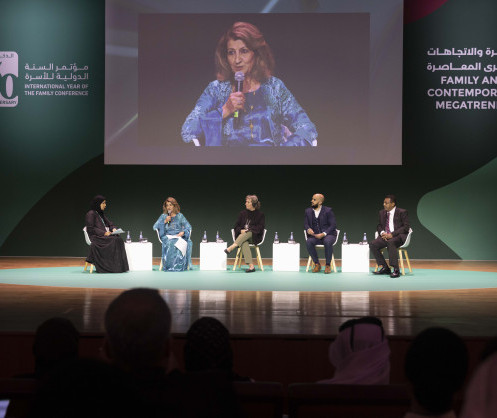Policies to protect families in countries affected by conflict, the global impact of population decline, and striking a balance between work and family life were placed in focus at the 30th Anniversary of the International Year of the Family Conference on Family and Contemporary Megatrends.
Organized by Qatar Foundation’s Doha International Family Institute (DIFI), in partnership with the Ministry of Social Development and Family, the Ministry of Foreign Affairs, and the United Nations Department of Economic and Social Affairs (UNDESA), the conference brought together more than 2,000 experts and policymakers from around the world to explore key trends affecting families, and policies and programs that strengthen the family’s place at the heart of society.
The conference was attended by eminent figures from across the Arab world including Her Excellency Shanaz Ibrahim Ahmed, First Lady of Iraq; Her Excellency Maya Morsi, Minister of Social Solidarity, Egypt; Her Excellency Dr. Amthal Hadi Hayef Al Huwailah, Minister of Social Affairs and Family and Childhood Affairs, Kuwait; Dr. Hector Hajjar, Minister of Social Affairs, Republic of Lebanon; as well as other international ministers and dignitaries.
Her Highness Sheikha Moza bint Nasser, Chairperson of Qatar Foundation, opened the conference by saying: “There is no doubt that the problems facing families are similar in all societies, but they differ in character from one country to the next. Families from the global North and families from the global South share many concerns. The most prominent are the negative impacts of technology and the issue of preserving mother tongues and cultural identities in an increasingly globalized world.”
According to new groundbreaking research reports (https://apo-opa.co/48DlFpD) published by Duke University and DIFI, 84% of parents in the region are concerned about the impact of screen time on family relationships, while 67% worry about the potential loss of traditional values in this digital age.
The United Nations General Assembly declared the creation of the International Year of the Family in 1994, underscoring the family’s pivotal role in society and the need for protecting and assisting families. Held every decade, the conference plays a pivotal role in developing policies and programs that empower families.
Deputy Secretary-General of the United Nations and Chair of the United Nations Sustainable Development Group, Her Excellency Amina J. Mohammed, stressed the importance of global action to protect families, saying: “Often the burden is on our women and our children – from Gaza to Sudan, Sudan to Ukraine, Ukraine to Myanmar, and so many more places. “It is incumbent on us, in this forum, that we seek to ensure family is about everyone, and leaves no one behind.”
Over the course of two days, participants explored the four major global megatrends – technological change, demographic change, migration and urbanization, and climate change – that affect families in Qatar, the region, and across the world.
There is no doubt that the problems facing families are similar in all societies, but they differ in character from one country to the next
Speaking in a discussion on ‘Work-Family Reimagined’, Dr. Maimoonah Khalil Al Khalil, Secretary General, Family Affairs Council, Saudi Arabia, highlighted the challenges facing working families: “Research has shown that when both parents are working and away from home for long hours, it affects fertility, marriage age, and divorce rates, so initiatives must be introduced to ensure that women are active in the workforce, but also to ensure that we are practicing the role of parenting well.
“While encouraging families to provide a better life for their children, we must support them with flexible work, active parenting, and early childhood resources. “Employers need to realize that these policies will make working women more productive and focused at work, and consequently contribute better to national development.”
In a session titled ‘Shattered Lives: The Impact of War and Conflict’, Palestinian researcher and academic Dr. Nour Naim, Executive Director of AI Minds Academy, spoke about the targeted destruction of the middle class and education in Gaza.
“The strength of the Gazan community lies in these tight family ties. Families are moving into each other’s homes, living together as if they were one family. These values are the foundation of society in Gaza. Unlike what typically happens in wars, there is a strong civil society with youth volunteers working to support poor families and assist with nursing care.
“The solidarity in Gaza should be studied in sociology textbooks worldwide. The primary driver is the understanding that we are all equal under the shadow of death, facing it at any moment. We don’t have the luxury of mourning – our only option is to stay strong and patient.”
The panel ‘Saving the Earth, Securing the Family’ explored the impact of climate change on families, focusing on the effects of climate-induced migration, food security, water scarcity, and eco-anxiety. Her Excellency Mahinur Özdemir Göktaş, Minister of Family and Social Services, Türkiye, said: “What is most important is that we bear collective responsibility. Government institutions globally require qualified human personnel, as well as financial support. We need cooperation between different countries to exchange our experiences and engage in environment coalition through effective and sustainable policies to address climate change challenges.”
Dr. Mohammed Behnassi, Senior Environmental Expert at the Economic, Social and Environmental Council in Rabat, Morocco, highlighted three interconnected climate change phenomena affecting families. “First is climate-induced displacement; second is food insecurity, which is worsened by climate change; and finally, war insecurity,” he said. “These interrelated challenges are triggering what we call climate migration – migration that is triggered by environment issues and is amplified by water stress, flooding, desertification, and deforestation.”
The conference concluded with the ‘Doha Call to Action’, a series of recommendations emphasizing the importance of designing family-oriented policies and empowering and enabling families to contribute to development, which will now be discussed with governments and policymakers.




